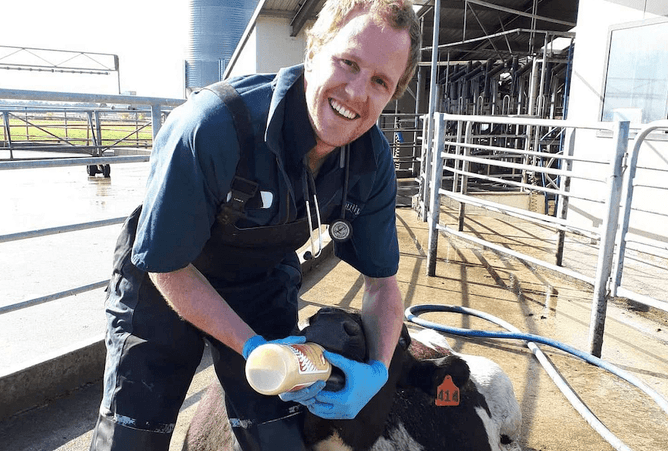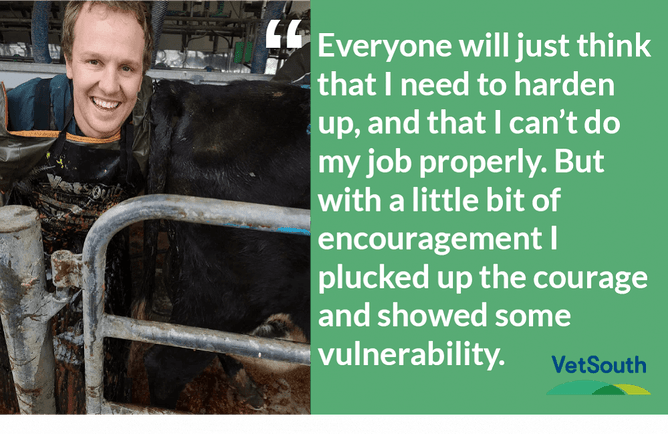Vet Dan shares with us his story and the importance of "checking in" with your rural colleagues.
As a production animal vet, we come across many different and challenging situations in our jobs every day. It is an incredibly unique role where we are invited onto farms many times throughout the year and build up long standing and often very close/intimate relationships with our clients. By far and away, these relationships are the best part of being a vet for me. Learning what your ambitions and goals are, meeting your family, farm workers and riding the ups and downs alongside you.
When I was training to be a vet, this was never really the part that I thought would get me out of bed every day. I just assumed it would be getting out and calving and scanning cows (which I still really enjoy), but becoming an integral part of many peoples business, lives and the community is really what sits well with me. What I also didn't realise when training at Massey, was that becoming an integral part of people's lives and the community also comes with great responsibility. On countless occasions, I have been to farms where things might not have been running as smoothly as normal, and farmers have not been their usual self. Quite often this is due to a multitude of things out of their control, which has put them under copious amounts of stress. From droughts, snowstorms, severe disease outbreaks, to depopulating entire herds for M. bovis, relationship break-ups, staff shortages, financial stress, mental health issues, isolation... The list is endless. Quite often I have found that the most useful skill I’ve had to engage is truly listening and honest empathy.
If I flip this now on its head and ask you farmers the question, how often have you had a vet that you have a long standing relationship with turn up on your farm and they have been a little bit off? They might’ve been a little bit hurried and short with you, or made a dumb mistake, or not quite been as chatty as normal. We vets are not immune to any of the things that you go through too. We too have to deal with staff shortages, relationship break-ups, financial stress, mental health issues, isolation, on top of severe disease outbreaks (where we might not have the answers for), depopulating entire herds for M. bovis, droughts, etc etc.
Many people may not know this, but when I first started up in Balclutha 4 years ago, it was all guns blazing for the first year. However, after that for about a year, I suffered from some pretty serious bouts of anxiety. I would be questioning what I am doing constantly, massively overthinking everything and my mind would be doing backflips. It led to me not sleeping, not being able to talk to my wife, unproportionable grumpiness, excessive stress, lack of motivation and general unhappiness.
I am sure some of my clients in Balclutha can picture this time in life. It wasn’t until I went to a counsellor that VetSouth put in the clinic one day, that I started to reverse things. She gave me some good perspectives, but also more importantly urged me to share this with my work colleagues. I initially thought, bugger that..! Everyone will just think that I need to harden up and that I can’t do my job properly. But with a little bit of encouragement, I plucked up the courage and showed some vulnerability. I spoke to my wife and our senior clinical team about this and I was met with empathy and compassion and an urge to support me however possible. Things did turn around slowly after that. I do still have periods where things might not be going as I hoped and anxiety/stress will kick in and I still need to be better at opening up about this with the people I care about in my life. After opening up to our vet team, I then got approached by a long time friend who opened up to me about their long term ongoing depression they were going through (which I had absolutely no idea about). For that reason alone it made it all worthwhile.
When looking back at this time, there were a lot of things in play that all contributed to this poor mental wellbeing. We had just moved to a new area, and we were feeling quite isolated. We had to rebuild our sense of belonging in a community which takes a lot of time and effort. I was undertaking a very challenging job that often had long hours and also had a lot of unknowns. This often resulted in physical and mental fatigue. Luckily for me, during that rough period, I had a very supportive workplace and wife that helped me through. However, if I had not sought help and shown that vulnerability and spoken to my colleagues or wife I am sure it would have been an even tougher time. Again, there are so many similarities between what I was going through and the farming industry. Often farming is highly stressful, working long hours, physically and mentally demanding, and in isolating areas. Often there are people moving to new areas where they need to make a new start and rebuild their belonging and purpose in a community.
We are all in this together, we all have a responsibility to look after one another and involve EVERYONE within our communities. Over the coming months, I am going to be ‘checking in’ on all the important people in my life and community. I would like to challenge all our farming clients to ‘check in’ with their farm staff, life partners, fertiliser rep, farm advisors, and in particular their tired vet that has just finished their 5th calving for the day… I would also like to challenge everyone reading this to respond to ‘checking in’ with honesty and willingness to show some vulnerability and open up about their current situation. It can be daunting to show some vulnerability, but undoubtedly you will get a good response from it. It may also allow for a platform for someone else to open up and show their vulnerability.
Kia Kaha rural New Zealand, we live in the most beautiful parts of the country and we are the backbone of this country. Please look out for each other and keep checking in.
Statistics time:
- Almost one-third of people in New Zealand have a personal experience of mental distress.
- 1in 6 people will be diagnosed with a mental illness in their lifetime by a medical professional in New Zealand (although the true figure is likely to be much higher due not everyone getting a diagnosis from a medical professional).
- 1 in 5 people experienced mental illness or addiction issues over the last year.
- Vets are 4th on the list of professions with the highest suicide rates. Farmers are 9th on that list.
- Female veterinarians are 3.5 times more likely to die by suicide than the general population.
- In the general population, men are 2.5 times more likely to die by suicide compared to women.
- Maori have the highest suicide rate out of all ethnicities.
- 15-24 year olds have the highest suicide rates, closely followed by 45-64 year olds.
- A quarter of all rural suicides in the past 8 years have been under 25 year old farmhands.
- Major risk factors are isolation, fatigue, depression, concerns over financial issues, alcohol or drug use.
- In almost 60% of cases of rural suicides the final trigger is a relationship break up or argument.
Resources:
- Is it an emergency? If you feel you or someone else is at immediate risk or harm, call 111 or go to your nearest hospital Emergency Department.
- Phone your local DHB Mental Health Crisis Team (CATT Team). Select your DHB for contact numbers or ring Healthline 0800 611 116 Just need to talk to someone? Phone 0800 111 757 to speak to, or ask a question of, a trained counsellor on the Depression Helpline.
- There is a wealth of useful information at www.mentalhealth.org.nz and at https://depression.org.nz/ including: Take the tests to see how you are feeling; The LowDown, especially geared for teens.
- Lifeline - 0800 543 354 or (09) 522 2999
- Youthline - 0800 376 633
- Samaritans - 0800 726 666
- Contact your local Rural Support Trust for help and advice on this number 0800 787 254 or go here for more information
- Dan Cragg



